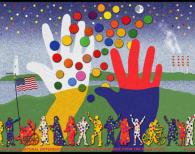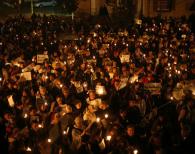Julie Mann leads a human rights class at Newcomers High School in New York, which has recently been focusing on thetreatment of local immigrants.
My name is Julie Mann and I’m an ESL and Human Rights teacher at Newcomers High School. About 17 years ago, I started a special human rights class at Newcomers.
In recent years, my human rights class has focused on immigration and anti-immigrant sentiments and actions, very locally in New York. More specifically, we started thinking and learning about treatment of immigrants on Long Island, first through the film Farmingville and then through the murder of Marcelo Lucero. When that horrific event occurred, my students and I felt we had to do something.
To help change negative perceptions of immigrants, we decided to teach others their stories. I truly believe that most hate crimes occur out of ignorance and fear of the unknown. I felt that if people got to know my students, they would have to love them! Last year, we created the Building Bridges project, because I felt it would help build a bridge between immigrants and those who feared them.
Long Island

Tragedy Shapes Community Leadership
Joselo Lucero never imagined that he would become a spokesperson and a symbol for community safety and immigrants’ rights. As he spoke Saturday night before the crowd gathered at the site of his brother’s murder one year earlier, the hundreds who had gathered despite inclement weather stood rapt.

Patchogue, NY: In the wake of the murder of Marcelo Lucero and other anti-immigrant violence on Long Island, many community members are using the arts and media to spread messages of hope and unity. Others are using faith-based means to discuss difference, examine questions around immigration, and build inclusive communities.
November 8 marks the one year anniversary of the hate crime killing of Marcelo Lucero in Patchogue, NY. The family of Marcelo Lucero and the people of Patchogue and Suffolk County, NY are planning a series of events.
Next Saturday Nov. 7th a Community Vigil will be held at the site where Marcelo Lucero was brutally slain on Nov. 8, 2008. Marcelo's family will be present. Participants have been asked to wear white t-shirts.
In the wake of the killing of Marcello Lucero by a group of local teenagers, the Long Island Council of Churches released a statement condemning the apparent hate crime. In the release, they state:
“In assaulting these two unarmed men, this gang of cowards betrayed everything that America stands for and that the good people of Patchogue have worked so hard to build in their community. It is particularly tragic that this occurred just before our nation prepares to celebrate Thanksgiving. Imagine where we would be today if Massasoit and his people had hunted down the Pilgrims.”
The Working Group recently spoke to Rev. Thomas Goodhue, executive director of the LICC, about responding to Marcello’s murder.
“You need to come together publicly,” says Thomas. “This is a time when you need to cross traditions and barriers yourself. My word back to the political leaders is to urge them to be in a Latino church this weekend.”
“The Obama victory has show that we have come a long way. I think we can say with more confidence that hate crimes are un-American. But these crimes show there is much work to do to create what MLK called ‘the beloved community.’ We need to publicly say – this is not us. “

Over a thousand people gathered for a candelight vigil in memory of Marcelo Lucero.
It is shocking and disheartening to report yet another killing of a young Latino immigrant by a group of teenagers, who admit they were “looking for a Mexican.” 37-year-old Marcello Lucero, who had come to the U.S. 16 years ago from Ecuador, was beaten and stabbed to death. Seven young men from Patchogue, NY were arrested in connection to his murder.
A thousand people gathered at the Patchogue train station on Friday to remember Lucero.
Patchogue is located in Suffolk County, which has passed a series of laws limiting services for undocumented residents. Just seven miles up the road from Patchogue is the town of Farmingville, a town whose acrimonious divisions over immigration were documented in the PBS POV film Farmingville four years ago.
